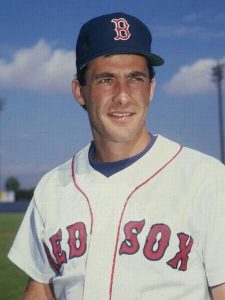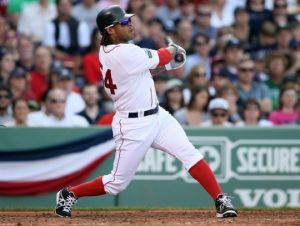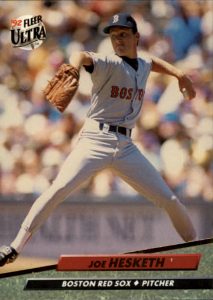The higher the numbers get, the less they have been worn. As we enter the fifties, the amount of players to select from, and generally the quality of players lessens. That is not to say these guys did not have their value, but you might not find yourself remembering who wore these numbers.
Number 51 – Daniel Bard
After wearing number 60 as a rookie in 2009, Bard switched to the number 51. He had his best career season in 2010.
Daniel Bard threw easy heat; He didn’t look like he was exerting much effort, but the ball would fly out of his hand at 98-100 miles per hour. He also had a nice slider to go with it, giving him a devastating two-pitch combination out of the pen.
This repertoire was at its best in that 2010 season, as Bard posted a 1.93 ERA and 1.00 WHIP as the Red Sox top setup man to Jonathan Papelbon. Bard was dominating again the next season until September, when he collapsed along with the rest of the team. At the end of August, Bard had a 2.03 ERA with batters hitting .164 against him. That includes an opening day disaster that saw him allow four runs. Between his second game of the season and the end of August, Bard had a fantastic 1.47 ERA. However, September saw him allow more runs than he had allowed from April 5th through the end of August and his ERA finished at 3.33.
The Red Sox decided to try Bard in the rotation in 2012, which made zero sense. Bard had begun his minor league career as a starting pitcher and was a disaster, prompting the move to the bullpen. This time didn’t go any better. Bard had a 6.22 ERA and never recovered. He spent most of the next several years throwing pitches to the backstop and hitting batters in the minor leagues. However, he was still a dominant setup man for a couple seasons wearing number 51.
Honorable Mention: Reid Nichols

Number 52: Mike Boddicker
The Red Sox traded Brady Anderson and Curt Schilling to the Orioles for Boddicker at the trade deadline in 1988 to bolster their rotation for the stretch run. Although Schilling ought to make the Hall of Fame, he wasn’t a starting pitcher until 1992. Brady Anderson was also a fine player, but hadn’t done anything before 1992 as well. That is four years later, had the Red Sox not traded them then, they very well could have moved on later before they amounted to anything anyways.
Mike Boddicker did his job for the Red Sox. Over the rest of the 1988 season he was 7-3 with a 2.63 ERA. He gave the Red Sox three very good starting pitchers and they won the American League East.
Boddicker pitched two more seasons for the Sox, winning 32 games. In 1990, he had his best season since 1984, going 17-8 with a 3.36 ERA. He also won the Gold Glove Award that season. He made a team high 34 starts, throwing 228 innings. In two-plus seasons with the Red Sox, Boddicker finished 39-22 with a 3.49 ERA.
Honorable Mention: Eduardo Rodriguez

Number 53 – Rich Hill
Rich Hill is not someone you would expect to find on a list like this for the Red Sox. He was very successful, but in a limited amount of innings while with the franchise.
Hill wore the number 53 with the Red Sox between 2010 and 2012. During this time he had been transitioned into a relief pitcher after a couple ineffective seasons and a torn labrum. The Red Sox signed Hill at the end of June in 2010 and made him a September callup. He pitched four shutout innings.
The next season Hill was given an opportunity out of the bullpen in May. Using a new sidearm motion, Hill was dominating, throwing eight shutout innings and striking out 12 batters before hurting his arm again. This time he would need Tommy John Surgery.
Back with the club in 2012, Hill recovered quickly enough to pitch for the team before April was over. However, another injury sidetracked his season until September. When the season was over, he had gone 1-0 with a 1.83 ERA 19.2 innings.
In total wearing number 53 for the Red Sox, Rich Hill was dominant in limited innings due to injury. He finished 2-0 with a 1.14 ERA and over a strike out per inning during this time. When he dominated in September of 2015 for the Red Sox, he was wearing a different number.
Honorable Mentions: Tomo Ohka, Brendan Donnelly, Chad Bradford

Number 54 – Darnell McDonald
Darnell McDonald is another surprising addition to this lineup of players. McDonald had one pretty good season as a part-time player for the Red Sox, and that’s enough to make him the best number 54 in team history.
McDonald was a first round pick way back in 1997, but only had 147 career Major League at-bats when the Red Sox signed him for the 2010 season. He would more than double his career at-bats that season. Over 117 games and 319 at-bats, McDonald hit nine home runs and stole nine bases in ten tries. He had a respectable .270/.336/.429/.766 batting line.
McDonald made an immediate impact on that 2010 team. In his first at-bat with the Red Sox, he pinch-hit for Josh Reddick in the bottom of the 8th inning, trailing by two with a runner on base. McDonald hit a two-run homer off Darren Oliver to tie the game at six. The Red Sox would win it the next inning when Darnell McDonald drove home the winning run with a base hit to center field.
McDonald’s stint with the Red Sox wasn’t as successful after that season. He batted .236 with six home runs in 2011 and would be released during the 2012 season after a poor start. His 2010 season was more than any other number 54 had to offer though.
Honorable Mention: Morgan Burkhart

Number 55 – Joe Hesketh
Joe Hesketh was a left-handed pitcher for the Red Sox from 1990-94. He mostly started but also relieved some with the team. He had one good season, a couple alright ones and one poor one, which is enough to get him the spot at 55 without anyone else even putting up a fight.
Hesketh was signed by the Red Sox off waivers on July 31, 1990. By 1991, he was a key member of the pitching staff. That season, Hesketh made 39 appearances, 17 of which were starts. He finished 12-4 for an American League best .750 winning percentage. He entered the starting rotation around midseason and went 10-3 with an ERA of 3.00 in the second half of the 1991 season. Hesketh had a 3.29 ERA on the season.
The next season he was mostly a starter, finishing 8-9 with a 4.36 ERA. After a poor 1993 season that saw him pitch mostly out of the bullpen, Hesketh rebounded for 1994. In that strike-shortened season he was 8-5 with a 4.26 ERA over 20 starts and five relief appearances. In total he was 31-26 with a 4.04 ERA with the Boston Red Sox.

Featured picture from Sports Illustrated
